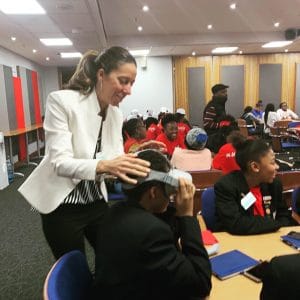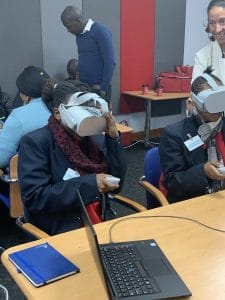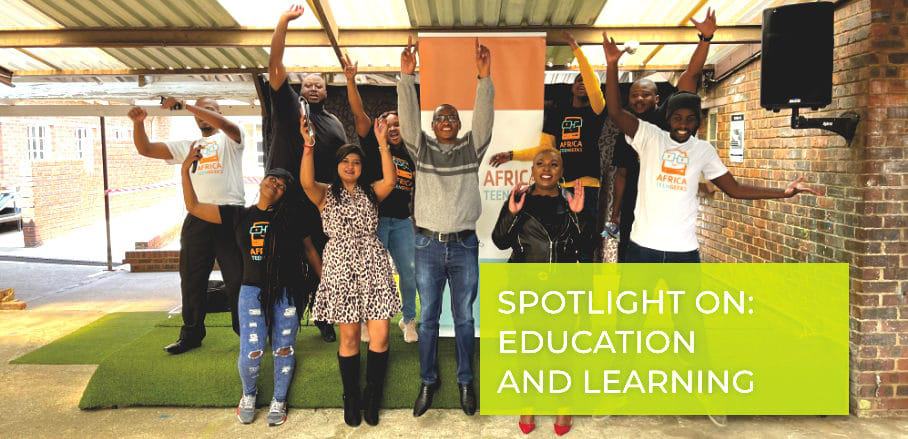How the Pandemic Can Teach Us to Leave No Child Behind
While online learning may not be the panacea for problems caused and amplified by COVID-19, it’s certainly a great place to start, writes Lindiwe Matlali, Founder and CEO of Africa Teen Geeks.
The inequality that plagues South Africa’s school system was no secret, even before COVID-19.
Those with money in South Africa can often access a far higher quality of education, deepening the already stark divide between our country’s haves and have-nots. But the ongoing pandemic has certainly amplified and exacerbated many of the issues young people in South Africa, particularly those growing up in poverty, are burdened with.
The New Epidemic of Teen Pregnancy
Figures provided by the Gauteng Department of Health paint an extremely troubling picture. In South Africa’s wealthiest and most populated province, the number of teenagers who have become pregnant has grown by a startling 60 per cent since the start of the pandemic. In 2020, more than 23,000 babies were born to mothers under the age of 18.
Sadly, teenage pregnancy is only one reason why young South Africans are dropping out of school. A recent survey shows that as many as 750,000 children dropped out of school since the start of the pandemic. This is an alarming trend that we are seeing across Africa.
In Uganda, for example, we are seeing teen pregnancy become an epidemic, mirroring the situation in Gauteng, with the country reporting a 22.5 per cent jump in the number of youths between 10 and 24 becoming pregnant. This, coupled with early marriage, child labour, and the many setbacks imposed on by the pandemic, has led to predictions that up to 30 per cent of all Ugandan children won’t make it back to school in 2022.
If we want to ensure that children both in South Africa and across the continent can continue with their education, rather than becoming permanent dropouts, we must act urgently.
Online Learning to Leave No Child Behind!
I would not suggest that there is an easy fix for these problems, nor downplay the importance of tackling them from as many angles as possible. However, as someone who has been involved in trying to increase access to online learning for Africans, I believe this is an integral measure to ensure that no child is left behind.
As COVID-19 has shown us, we can no longer afford to look at education as being at the mercy of geography. The idea that all children, no matter what their background or location, should be able to access online learning opportunities, is at the forefront of the work that Africa Teen Geeks is involved in.

Girl Geek Summit at a gathering in Johannesburg © Africa Teen Geeks
Already, we have seen a massive shift towards online schooling amid the spread of the virus. The University of Cape Town, for example, will be offering an online learning syllabus for high school learners in 2022 at a cost of 2,095 Rand (117 Euro) per month. But these rates are too high for many South Africans, who need access to affordable or, better yet, free online learning facilities. This is where governments must step in and play a role because online learning is our best bet for targeting learners who would otherwise be left behind.
One example of this is teenage pregnancy. While we can by no means accept the rising stats as something immutable, and interventions to reduce these numbers must take place, as educators we also need to accept that teenagers who have fallen pregnant are a reality. Their lives and especially their schooling cannot stop because they are becoming parents.
They need to have access to resources allowing them to further themselves while unable to attend school, coupled with access to online counselling, to deal with the demands of having children at a young age.
Policy Failures in Embracing E-Education
In an article on EdTech in South Africa, Arthur Goldstuck speaks of the “abject failure” of the SA government to embrace digital education, even after a white paper on e-education makes the commitment that “every South African learner in the general and further education and training bands will be ICT capable by 2013.” We need to talk about how to ensure these goals return to the policy agenda.
Neglecting EdTech, the technology facilitating learning, is no longer an option. It is an essential part of our present and future education systems – and children who cannot access it are at risk of being left out in the cold while the world around them evolves.
One role of EdTech is in bridging the economic divide in South Africa’s education system. At many private schools, technology has been integrated into every aspect of learning, rather than residing on the periphery of the syllabus. If this doesn’t happen in public schools as well, the already wide gulf between those who can and cannot afford quality education will only deepen.

Girl Geek Summit at a gathering in Johannesburg © Africa Teen Geeks
Online learning can also offer young people a chance to avoid becoming dropouts. We must work together with governments to make sure online schooling becomes official policy, with zero-rated platforms – ones exempt from value-added taxation – available to all learners who cannot attend normal schooling for a multitude of reasons. While the Adult Basic Education and Training (ABET) programme offers young adults an opportunity to finish school, this is not sufficient, as children far too young to benefit from ABET are dropping out, too; and because we need options for young people who want to complete their schooling now, rather than as adults.
What Comes After the Pandemic?
COVID-19, and the national lockdowns it has caused, has multiplied troubles worldwide, particularly in Africa, where our economy and support systems may not be robust enough to weather the turbulences. But there is hope, as well, that the pandemic can be an opportunity for learning and growth. One of the things it has taught us – that all children need access to education no matter what conditions they are born into – can be harnessed to move forward into a world where truly no child is left behind; but only if we learn from our current situation and act on it without delay.
South Africa’s Constitution, often lauded as one of the most progressive in the world, emphasises that every child has the right to basic education. But the lofty goals of this document are not always reflected in our day-to-day reality. I believe online education can help get us there, and I look forward to working with governments, not just in my home country but across Africa, to make this a reality!
- How the Pandemic Can Teach Us to Leave No Child Behind - 13. January 2022
